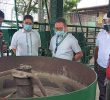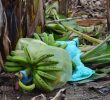By GERMELINA A. LACORTE | Davao Today
DAVAO CITY�A top official of the island garden city of Samal cracked a joke about the fish of Davao Gulf before a recent mining conference here to raise a point on the need to protect the environment amidst the flurry of activities in mining.
�The fish that we�re going to eat for lunch already contains an intolerable level of cyanide,� Samal vice mayor Orly Amit said in jest, as he presented the environment group results after a workshop at the Waterfront Hotel here. �We�re going to eat it all, even those of us involved in mining.�
Participants composed of foreign and local mining executives and government officials burst out laughing but Amit said everything in Davao Gulf will be affected once mining go full blast without strong regard for the environment.
�Even if we don�t have mines on Samal island, we are all affected so we have to join hands together,� he said. �The fish in Davao Gulf doesn�t stay in one place, you know, it can also reach Governor Malanyaon�s city of Mati and other parts of the ocean.�
He defined responsible mining as �borrowing the land from future generation,� that�s why those who are involved have to make sure to safeguard the environment to �eventually return it safe and sound� in the future. He earned applause from the pro-mining participants, who vowed to only allow responsible mining in Davao Gulf.
Environment groups, however, are not easily convinced.
Jo Villanueva, member of the nationwide group Alyansa Tigil Mina, said that without sufficient safeguards put in place, there is always a danger of government restrictions being ignored. �How can DENR (Department of Environment and Natural Resources), for instance, monitor all of 300 mining permit holders in the country?� Villanueva said in another forum joined in by anti-mining groups.
Villanueva said that groups opposed to the entry of foreign mining in the country is now circulating a draft proposal for an alternative mining bill that will not threaten the environment and safeguard food security in the country. �It will address issues which were missed out in the 1995 Philippine Mining Act, that allowed the entry of big foreign mining firms in the country,� she said.
Among others, the draft bill will require stringent implementation of environment and land use laws to ensure that mining companies will not leave a tail of disasters in areas where they operate, she said. It will also call for actual, and not just token, participation of the communities in the mining projects.
�Most of all, we will no longer allow the entry of foreign mining firms,� Villanueva said.
Although there seems to be a hype in the mining activities in the country, Villanueva said that most of the companies applying mining permits are mere prospectors who do not really plan to embark in actual mining projects but are only waiting for a chance to sell their mining permits to big mining firms.
She also said that most foreign mining firms are also using these prospectors to clear the area and only decide to come in later after these �social issues� are ironed out.
Rep. Lorenzo Tanada III, a member of the committee on the environment in the House of Representatives agreed. �There seems to be a lot of selling here and there, no matter whether there is an actual deposit or not in the area,� Tanada said in the anti-mining forum at the Grand Menseng Hotel.
He said that government only tried to assuage the fear of civic organizations about the adverse impact of mining in the environment. �Even the so-called community participation and community consultations are nothing but lip service,� he said, �In cases where communities are strongly against mining, they�re actually being ignored.�
Victor Agustin, the regional director of the National Economic Development Authority (Neda) earlier complained that the mining industry has been attracting only a few �real� investors despite the opening of the country to foreign mining firms.
Agustin said that most of those who applied for mining permits were only speculators who were not really planning to go into actual mining projects.
He said that the jobs targeted for mining in the Davao region failed to meet their midterm targets because the actual activities in mining were not really as good as their projections.
�A lot of speculators who don�t know anything about the technical implications are selling mining areas to global corporations whose only interest is to rake profits,� said Villanueva.
She said that the mergers and acquisitions frequently happening among global mining companies these days aggravate these threats, considering the loose implementation of environment laws in the country.
�It�s becoming such a very risky business,� said Villanueva, �We�re becoming subject to the whims of the global market. In the communities, mining is not just about profit,� she said. �It�s about the survival.� (Germelina Lacorte/.davaotoday.com)










